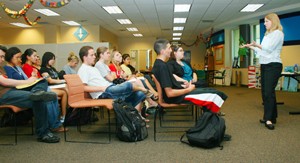No matter what their achievements or how they live their lives, everyone still sees the politics of power and privilege every day – at least, that’s what the Atlas Leadership Program aims to explain.
The program held its third social justice workshop Tuesday night titled “”Power and Privilege.””
Jennifer Hoefle, senior coordinator at the Social Justice Programs Center for Student Involvement and Leadership, conducted the seminar that discussed privilege and oppression in relation to people’s lives and social identities.
“”I come at social justice work from a perspective we have to engage our own identities, and we have to understand ourselves and where we fit in the structure,”” Hoefle said.
The event was an interactive discussion where students asked questions throughout the presentation about their own privileges and life experiences so far.
The students participated in a paired activity in which each person had one minute to talk in response to a prompt given by Hoefle while their partner gave them undivided attention.
“”Social justice is about action. It’s about doing something,”” Hoefle said. “”I think this kind of information is important because it can inspire people to want to get involved with more.””
Some of the topics addressed were, “”What is one way in your life that you have experienced disadvantage or oppression?”” and “”Why would I want to study or understand privilege?””
The Atlas Social Justice Leadership certificate is designed to give students an opportunity to learn about power, privilege and systems of oppression, as well as tools to fight social injustice. Students were encouraged to share their opinions with the group. The purpose was to learn how each person is connected with the dynamics of oppression.
Devon Jernigan, an Atlas mentor, was on hand to answer students’ questions, participate in activities and give information about different workshops.
“”I am a familiar face to the different members in the Atlas program,”” Jernigan said. “”I think everyone should become aware of what’s out there, helping to become a better leader.””
Toward the end of the event, students sat in a circle and each shared their answer to the question, “”How will you use your privilege?””
They were given an information sheet on how people are privileged in terms of race, gender and class.
“”I like how we ended tonight, how we are all intertwined, and that one person’s privilege may be another’s oppressor,”” said Nick Carlstrom, an agricultural resource economics sophomore. “”This is a big mixing pot we’re all in, and the more we’re aware of it, the more we can work together,”” he said.
The next workshop will look at social identity development and how varying status among social groups impact everyone’s identities. All students are welcome to attend regardless of whether they are involved in the Atlas program.
“”For students growing and going through their own development, it’s a good time to really start to ask these questions about how their identities (are) situated in the larger social structure,”” Hoefle said.









